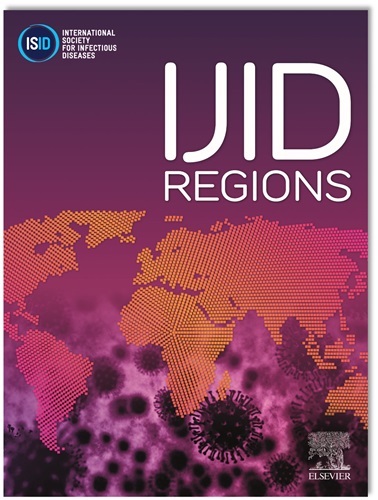通过检测和治疗规划评估COVID-19口服抗病毒药物的引入:来自四个非洲国家的队列研究结果
IF 4.3
2区 医学
Q1 INFECTIOUS DISEASES
引用次数: 0
摘要
在非洲,治疗COVID-19的口服抗病毒药物如尼马特韦/利托那韦在很大程度上仍然无法获得。加纳、马拉维、卢旺达和赞比亚都是COVID治疗快速启动联盟的成员,它们利用现有基础设施迅速启动了COVID-19检测和治疗项目。我们描述了护理级联中个人层面的影响。方法:在四个国家的36个设施中进行了一项回顾性队列研究,收集了接受筛查治疗的SARS-CoV-2阳性个体的数据。治疗标准包括:COVID-19疾病严重进展高风险、症状出现5天内出现、轻至中度COVID-19疾病严重程度;治疗资格最终由训练有素的卫生保健工作者确定。结果:在1941名参与者中,50.2%被确定为符合条件,而65.2%的人处方了尼马特瑞韦/利托那韦。在处方患者中,1265例(73.2%)接受随访,其中99.4%确认开始治疗,97.6%完成5天疗程。报告了两例严重不良事件,但均未归因于尼马特利韦/利托那韦。结论:这些数据首次表明,在开展实施研究的同时,中低收入国家可以快速、有效和安全地实施COVID-19口服抗病毒治疗。项目迅速将其COVID-19应对措施整合到现有的卫生服务基础设施中,从而实现了权力下放,并证明在突发卫生事件期间,在资源匮乏的环境中,在政府卫生系统中引入新开发的诊断和治疗方法是可行的。公平和及时获得诊断和治疗对于应对新出现的全球疾病威胁和实现全球卫生公平至关重要。本文章由计算机程序翻译,如有差异,请以英文原文为准。
Evaluating the introduction of COVID-19 oral antivirals through a test and treat program: outcomes from a cohort study in four African countries
Introduction
Access to oral antivirals like nirmatrelvir/ritonavir to treat COVID-19 remains largely unavailable across Africa. Ghana, Malawi, Rwanda and Zambia, all members of the COVID Treatment QuickStart Consortium, leveraged existing infrastructure to rapidly commence COVID-19 test-and-treat programs. We describe the individual-level impact within the cascade of care.
Methods
A retrospective cohort study was conducted in 36 facilities across four countries that captured data on SARS-CoV-2 positive individuals who were screened for treatment. Treatment criteria included being high-risk for severe COVID-19 disease progression, presenting within five days of symptom onset, and having mild-to-moderate COVID-19 disease severity; treatment eligibility was ultimately determined by trained healthcare workers.
Results
From 1941 participants, 50.2% were determined eligible while 65.2% were prescribed nirmatrelvir/ritonavir. Among those prescribed, 1265 (73.2%) received follow-up, among whom 99.4% confirmed treatment initiation and 97.6% completed the five-day treatment course. Two serious adverse events were reported, but neither was attributed to nirmatrelvir/ritonavir.
Conclusions
These data are the first to suggest COVID-19 oral antiviral treatment can be quickly, efficiently and safely deployed in lower- and middle-income countries, in parallel with implementation research. Programs rapidly integrated their COVID-19 response into existing health service infrastructure, allowing for decentralization and demonstrating that introducing newly developed diagnostics and treatment in government health systems is feasible in lower-resourced settings during health emergencies. Equitable and timely access to diagnostics and treatments is crucial to combat emerging global disease threats and achieve global health equity.
求助全文
通过发布文献求助,成功后即可免费获取论文全文。
去求助
来源期刊
CiteScore
18.90
自引率
2.40%
发文量
1020
审稿时长
30 days
期刊介绍:
International Journal of Infectious Diseases (IJID)
Publisher: International Society for Infectious Diseases
Publication Frequency: Monthly
Type: Peer-reviewed, Open Access
Scope:
Publishes original clinical and laboratory-based research.
Reports clinical trials, reviews, and some case reports.
Focuses on epidemiology, clinical diagnosis, treatment, and control of infectious diseases.
Emphasizes diseases common in under-resourced countries.

 求助内容:
求助内容: 应助结果提醒方式:
应助结果提醒方式:


